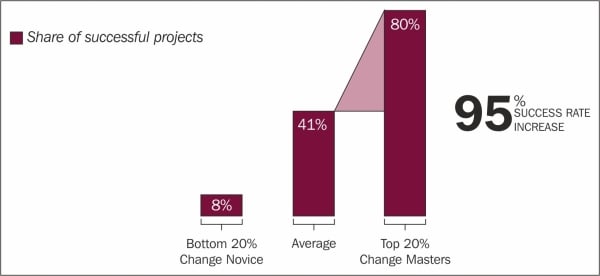Why Change Management is important to project success
In 2008, IBM Global Business Services published the results of their Global Change Management Study in a presentation called Making Change Work. With input from over 1,500 project practitioners from 15 countries and 21 industries, Making Change Work provides valuable insights into how Change Management contributes to the success of projects.
One of the most troubling findings of the survey was that only 41 percent of projects fully met their objectives. This means that the project you are currently working on potentially has less than a 50 percent chance of being successful. That's a scary number. The following figure is an illustration to these statistics:

Less than half of all projects are successful (IBM Global Business Services, Making Change Work, 2008)
A McKinsey study conducted in the same year surveyed over 3,000 executives from various countries and industries (The McKinsey Quarterly, McKinsey Global Survey Results: Creating organizational transformations, July 2008). Their results were even worse. Only a third of executives surveyed said that their organizations successfully achieved change.
When the IBM study's participants were asked about the major challenges they faced in implementing change, the overwhelming response was that "soft" factors such as employee attitudes and corporate culture posed more of a challenge than "hard" factors such as processing change and technical barriers Refer to the following figure for an illustration of these statistics:

Many of the barriers to successful change are "soft" factors (IBM Global Business Services, Making Change Work, 2008)
Luckily, they also found that there were ways to mitigate these challenges. Ten critical factors to successfully bring about change were identified. All of them form part of a good Change Management program, shown as follows:

Most of the critical factors for successful change are part of a good Change Management program (IBM Global Business Services, Making Change Work, 2008)
The Pillars of Change we just reviewed cover seven of the ten critical success factors. The following list shows which success factors are included in each pillar:
Sponsorship:
Top management sponsorship
Change agents (pioneers of change)
Organization design:
Efficient organization structure
Monetary and non-monetary incentives
Stakeholder management:
Employee involvement
Communication:
Honest and timely communication
Training:
Efficient training programs
Furthermore, the top 20 percent of organizations as defined by project success rate reported an 80 percent project success rate. These organizations were deemed "Change Masters", and had a significantly higher rate of success than the average company, shown as follows:

Organizations that excel at change have a much higher rate of project success (IBM Global Business Services, Making Change Work, 2008)
If these facts and figures have energized you to build a strong Change Management program and strive for the success of your project in your organization, but have left you feeling a bit overwhelmed about how to start, consider this conclusion from the McKinsey study (7):
"One implication is that companies should use a range of tactics in conjunction to engage their employees as early as possible. They ought to base their tactics on the type of transformation they are planning and the methods to which their employees will respond best."
That is exactly what this book is designed to help you achieve.























































